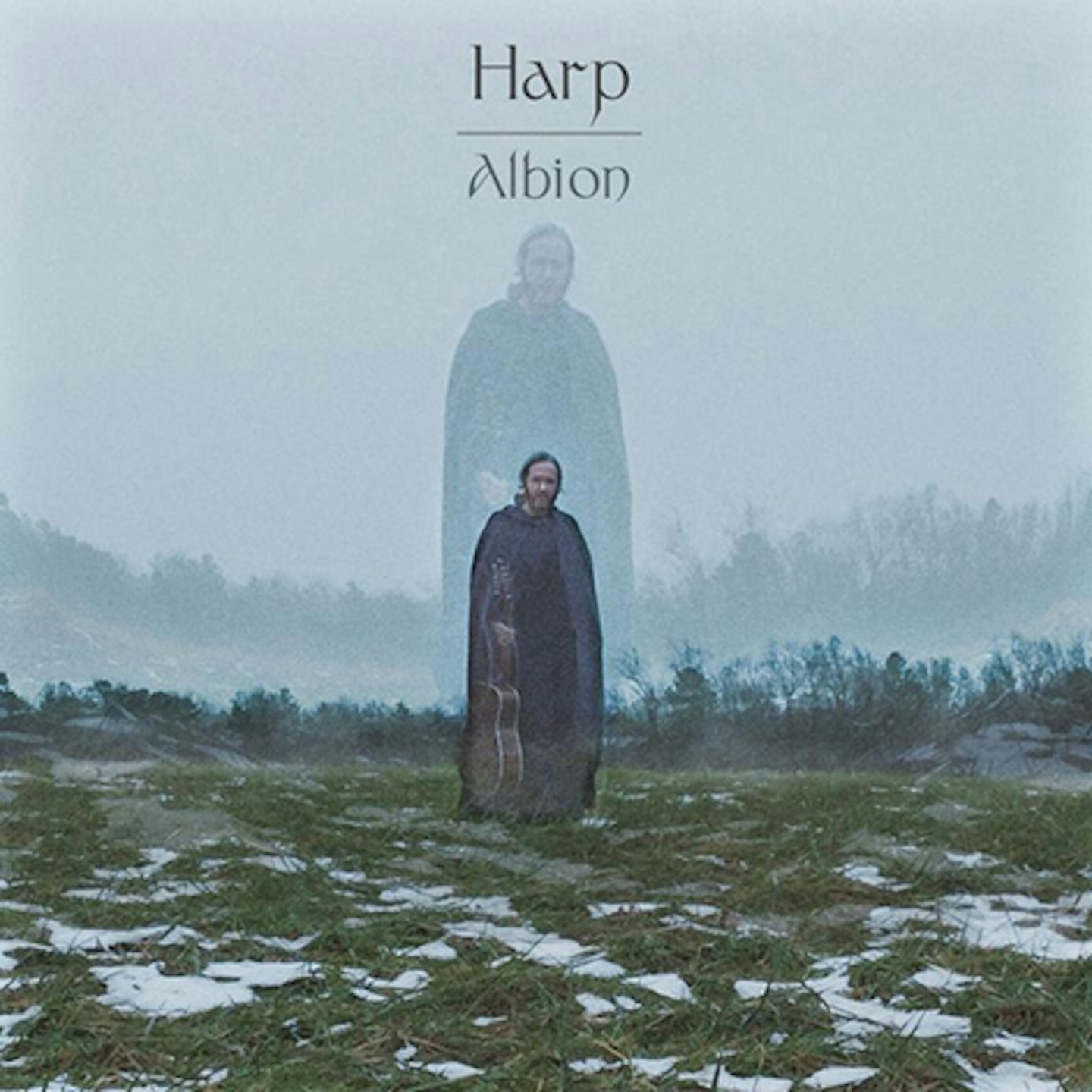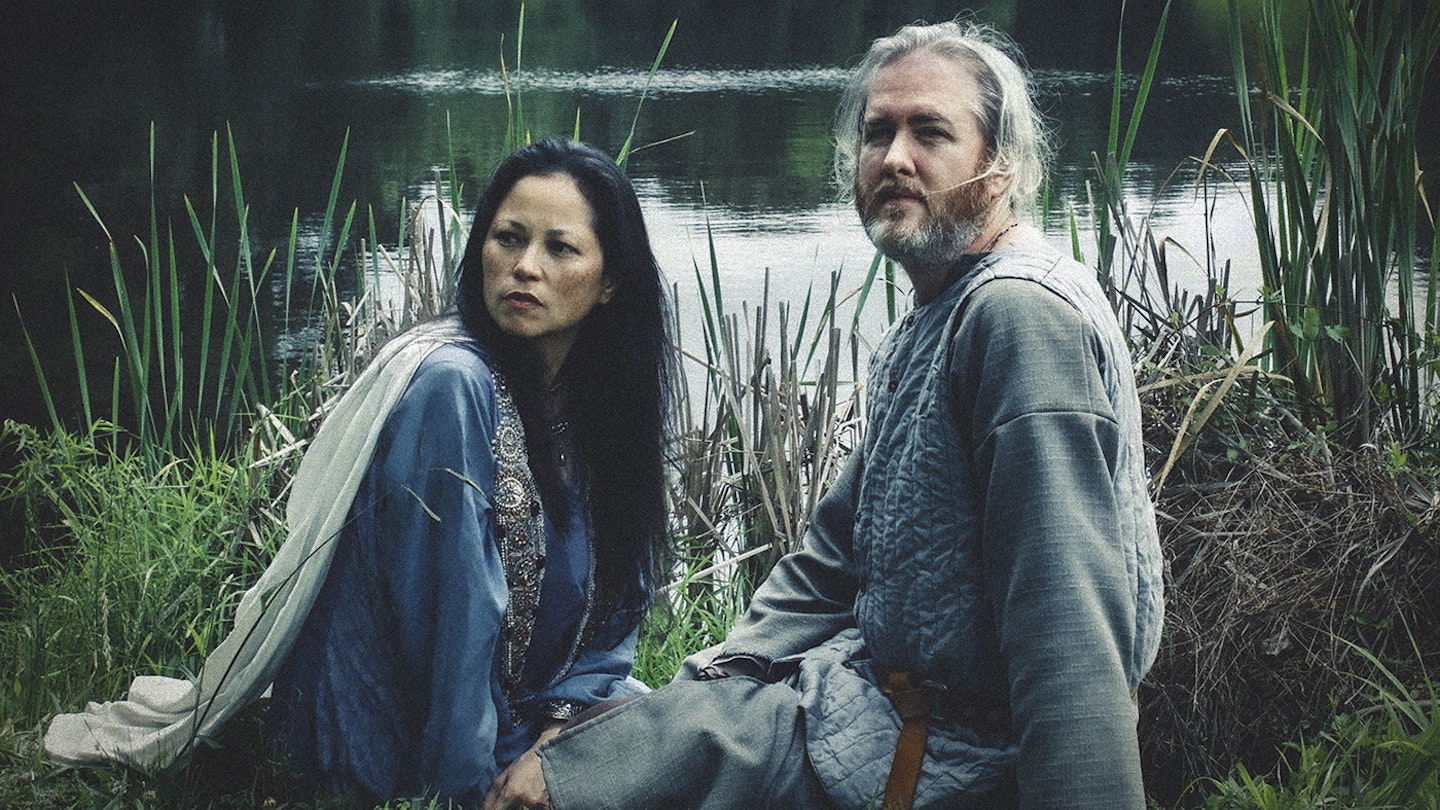Harp
Albion
★★★★
Bella Union

LYING CLOSE to Cowbeech, Foul Mile and Wartling in deepest East Sussex, Herstmonceux is not so much village as real-life Marillion album cover. It is known for its windmill, its castle, and the green telescope domes that once housed the Royal Observatory; a medieval festival every August makes it perfect for anyone who wants quality time in doublet and hose. It’s possible that Tim Smith might fit that bill: a song called Herstmonceux closes Harp’s Albion, the first record from the former Midlake singer and his wife and creative collaborator Kathi Zung.
The kind of Anglophile drawn to the wet greys and browns of the English countryside – not to mention the ruined-abbey atmospheres of The Cure’s Faith – Smith named the track after a memorable day trip to the village while recording with Brighton-based guitarist Max Kinghorn-Mills. It’s a rare moment of concrete reality amid Albion’s uncanny, half-lit spaces. Given the title, the band name, the cloak-wearing artwork and promo shots of Smith and Zung with chessboard and tankard, you might assume it’s a kind of Arthurian concept album, prog rock LARPing from a man who, after all, once made a record called The Trials Of Van Occupanther. It’s an impression intensified by the video for the half-timbered Fleetwood Mac of I Am The Seed, where Smith drifts through a wooden church in a quilted jerkin and bonnet, his breath visible around him.
Yet there are no jester’s tears here, just Smith’s. Behind the costuming and the occasionally archaic language (“Let thy winds/ And the tempest beat”), Albion’s ‘concept’ turns out to be a simple one: sometimes it’s hard to be human. It’s even harder when love leaves your life; harder still if your muse follows suit. “When the vow had finally broken, I set out alone,” sings Smith on Silver Wings, a drizzle-damp Crosby, Stills & Nash that hints at the turmoil that triggered Harp’s mission.
Smith left Midlake in 2012, amid recording sessions for the intended follow-up to the Texan band’s third album, 2010’s The Courage Of Others. He would later say that his perfectionist creative process was not compatible with the life of a working band – a claim supported by the fact Albion has taken 10 years to materialise. Smith’s first marriage ended shortly afterwards; it was only when he met Zung – a puppet-maker who has worked with Guillermo Del Toro – that he found a foil for his meticulous work (and one who could programme a drum machine.)
Albion, then, represents a double grail quest – both the search for love and the struggle for artistic fulfilment. While there are literal cloaks involved, there’s also a heavy metaphorical veil: Smith’s songs are wrapped in images of fountains and mountains, birds of prey and cathedrals, regrowth and renewal. He has form for constructing these uncanny, time-slipping worlds. Midlake’s 2006 breakthrough The Trials Of Van Occupanther existed in a strange storybook space, Smith wondering what life would be like “been born in 1891”, remembering long-gone communities and ocean migrations that may or may not have existed.
Harp reaches further back, but it still feels like a way of translating difficult emotions into a more manageable, once-removed form, hooding them in fantasy to avoid a direct confrontation with the self. “Well, I went mad/I was mad,” Smith sings on Throne Of Amber, a song that suggests a terrible suspension of reality, Radiohead’s Street Spirit (Fade Out) chased through a maze by The Cure. “Bring me an axe/Bring me a spade/Bring me a winding sheet.” I Am The Seed, meanwhile, is not about joyful blooming, but a thwarted germination, a barren silence. “You write about the thing you’ve been doing for years, feeling like you’re failing at almost every day,” Smith tells MOJO. That desolation is inescapable on Albion, its ageless chill not achieved with lutes and crumhorns but drum machines and shivering guitars. For three years of the past decade, Smith says, he was listening to Faith non-stop, and there’s a funereal shudder to I Am The Seed or The Pleasant Grey. He also developed an interest in “Clan Of Xymox, those more cold wave kind of bands like [French ’80s dark-wavers] Asylum Party”.
Albion isn’t really about living in the ’80s any more than it is about the sixth centur y, yet whatever Smith puts through his filters comes out as part of his frosted sound-world. The lovely sighing Daughters Of Albion and Countr y Cathedral Drive’s Go-Betweens hush both nod to William Blake’s myth-forging poem Visions Of The Daughters Of Albion. Chrystals sounds like someone left Rufus Wainwright out in the rain; there are persistent Midlake- era traces of Fleetwood Mac, a little Robert Wyatt, and, on the fluting instrumental Moon, the synthesized beauty of Beverly Glenn-Copeland.
Yet Albion does find redemption, reward for such a long, bleak mission. “Wherever thou art is where I am,” sings Smith on Shining Spires, while the Cocteau Twins tumble of A Fountain details the hazards he has experienced – bandits, drunk guards, cursed thoughts – before declaring “a new love is born”. The closing Herstmonceux, opening with a welcome swirl of other voices recorded by Smith at evensong in a Scottish cathedral, repeats the line “I am a seed”, but this time there’s the chance of green shoots: “Quietly the sorrow flees from me/Bright as day the soul no longer grieves.”
It’s true Albion carries itself with a care that could be construed as cold – Smith says he is working on songs more infused with a “’70s warmth”. Yet its gloomy roving and monkish precision make its spring thaw all the more affecting. “I felt it begin/With a hundred new thoughts/And a vision again,” sings Smith on Silver Wings. “Was it something or not?” Albion is something, no doubt about that, a quest so beautifully completed that once again, after all those years in thrall to its demands, Smith is free to roam wherever he wants.
Albion is out now via Bella Union
